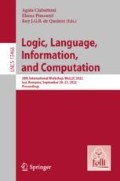Abstract
Social media is not a neutral channel for news consumption. How visible information posted online is, depends on many factors such as the network structure, the emotional volatility of the content and the design of the social media platform. In this paper, we use formal methods to study the visibility of agents and information in a social network. We introduce a modal logic to reason about a social network of agents that can follow each other, post and share information. We show that by imposing some simple rules on the system, a potentially malicious agent can take advantage of the network construction to post an unpopular opinion that may reach many agents. The network is presented both in a static and dynamic form. We prove completeness, expressivity and model checking problem complexity results for the corresponding logical systems.
Access this chapter
Tax calculation will be finalised at checkout
Purchases are for personal use only
References
Andi, S.: How and why do consumers access news on social media? (2021). https://reutersinstitute.politics.ox.ac.uk/digital-news-report/2021/how-and-why-do-consumers-access-news-social-media
Areces, C., ten Cate, B.: Hybrid logics. In: Blackburn, P., van Benthem, J., Wolter, F. (eds.) Handbook of Modal Logic, Studies in Logic and Practical Reasoning, vol. 3, pp. 821–868. Elsevier (2007)
Baltag, A., Christoff, Z., Rendsvig, R.K., Smets, S.: Dynamic epistemic logics of diffusion and prediction in social networks. Stud. Log. 107(3), 489–531 (2019). https://doi.org/10.1007/s11225-018-9804-x
Baltag, A., Moss, L.S.: Logics for epistemic programs. Synthese 139(2), 165–224 (2004). https://doi.org/10.1023/B:SYNT.0000024912.56773.5e
Belardinelli, G.: Gatekeepers in Social Networks: Logics for Communicative Actions. Master’s thesis, ILLC, University of Amsterdam (2019)
Blackburn, P., ten Cate, B.: Pure extensions, proof rules, and hybrid axiomatics. Stud. Log. 84(2), 277–322 (2006). https://doi.org/10.1007/s11225-006-9009-6
Blackburn, P., de Rijke, M., Venema, Y.: Modal Logic, Cambridge Tracts in Theoretical Computer Science, vol. 53. CUP (2001)
Brady, W.J., Wills, J.A., Jost, J.T., Tucker, J.A., Bavel, J.J.V.: Emotion shapes the diffusion of moralized content in social networks. Proc. Natl. Acad. Sci. 114(28), 7313–7318 (2017)
Christoff, Z., Hansen, J.U.: A logic for diffusion in social networks. J. Appl. Log. 13(1), 48–77 (2015)
Christoff, Z., Hansen, J.U., Proietti, C.: Reflecting on social influence in networks. J. Logic Lang. Inf. 25(3–4), 299–333 (2016). https://doi.org/10.1007/s10849-016-9242-y
Dennis, L.A., Fu, Y., Slavkovik, M.: Markov chain model representation of information diffusion in social networks. J. Log. Comput. (2022)
van Ditmarsch, H., van der Hoek, W., Kooi, B.: Dynamic Epistemic Logic, Synthese Library, vol. 337. Springer (2008). https://doi.org/10.1007/978-1-4020-5839-4
Easley, D., Kleinberg, J.: Networks. Crowds and Markets, CUP (2010)
Fischer, M.J., Ladner, R.E.: Propositional dynamic logic of regular programs. J. Comput. Syst. Sci. 18(2), 194–211 (1979)
Franceschet, M., de Rijke, M.: Model checking hybrid logics (with an application to semistructured data). J. Appl. Log. 4(3), 279–304 (2006)
Jackson, M.O., Rogers, B.W., Zenou, Y.: The economic consequences of social-network structure. J. Econ. Lit. 55(1), 49–95 (2017)
Kooi, B., Renne, B.: Arrow update logic. Rev. Symb. Log. 4(4), 536–559 (2011)
Kurtonina, N., de Rijke, M.: Bisimulations for temporal logic. J. Logic Lang. Inf. 6(4), 403–425 (1997). https://doi.org/10.1023/A:1008223921944
Lorini, E., Sartor, G.: A STIT logic for reasoning about social influence. Stud. Log. 104(4), 773–812 (2016). https://doi.org/10.1007/s11225-015-9636-x
Napoli, P.M.: Social media and the public interest: governance of news platforms in the realm of individual and algorithmic gatekeepers. Telecomm. Policy 39(9), 751–760 (2015)
Nguyen, C.T.: Echo chambers and epistemic bubbles. Episteme 17(2), 141–161 (2020)
Pedersen, M.Y., Slavkovik, M., Smets, S.: Social bot detection as a temporal logic model checking problem. In: Ghosh, S., Icard, T. (eds.) LORI 2021. LNCS, vol. 13039, pp. 158–173. Springer, Cham (2021). https://doi.org/10.1007/978-3-030-88708-7_13
Pedersen, M.Y., Smets, S., Ågotnes, T.: Analyzing echo chambers: a logic of strong and weak ties. In: Blackburn, P., Lorini, E., Guo, M. (eds.) LORI 2019. LNCS, vol. 11813, pp. 183–198. Springer, Heidelberg (2019). https://doi.org/10.1007/978-3-662-60292-8_14
Pedersen, M.Y., Smets, S., Ågotnes, T.: Further steps towards a logic of polarization in social networks. In: Dastani, M., Dong, H., van der Torre, L. (eds.) CLAR 2020. LNCS (LNAI), vol. 12061, pp. 324–345. Springer, Cham (2020). https://doi.org/10.1007/978-3-030-44638-3_20
Pedersen, M.Y., Smets, S., Ågotnes, T.: Modal logics and group polarization. J. Log. Comput. 31(8), 2240–2269 (2021)
Plaza, J.: Logics of public communications. Synthese 158(2), 165–179 (2007). https://doi.org/10.1007/s11229-007-9168-7
Rathore, N.C., Tripathy, S.: Effective visibility prediction on online social network. IEEE Trans. Comput. Soc. Syst. 8(2), 355–364 (2021)
Samanta, M., Pal, P., Mukherjee, A.: A novel scheme for abatement of privacy concern by controlling the reachability in online social network. In: Abraham, A., Cherukuri, A.K., Madureira, A.M., Muda, A.K. (eds.) SoCPaR 2016. AISC, vol. 614, pp. 686–697. Springer, Cham (2018). https://doi.org/10.1007/978-3-319-60618-7_67
Tang, J., Musolesi, M., Mascolo, C., Latora, V.: Characterising temporal distance and reachability in mobile and online social networks. Comput. Commun. Rev. 40(1), 118–124 (2010)
Acknowledgements
We would like to thank anonymous reviewers for their insightful comments and constructive criticism.
Author information
Authors and Affiliations
Corresponding author
Editor information
Editors and Affiliations
Rights and permissions
Copyright information
© 2022 The Author(s), under exclusive license to Springer Nature Switzerland AG
About this paper
Cite this paper
Galimullin, R., Pedersen, M.Y., Slavkovik, M. (2022). Logic of Visibility in Social Networks. In: Ciabattoni, A., Pimentel, E., de Queiroz, R.J.G.B. (eds) Logic, Language, Information, and Computation. WoLLIC 2022. Lecture Notes in Computer Science, vol 13468. Springer, Cham. https://doi.org/10.1007/978-3-031-15298-6_12
Download citation
DOI: https://doi.org/10.1007/978-3-031-15298-6_12
Published:
Publisher Name: Springer, Cham
Print ISBN: 978-3-031-15297-9
Online ISBN: 978-3-031-15298-6
eBook Packages: Computer ScienceComputer Science (R0)


